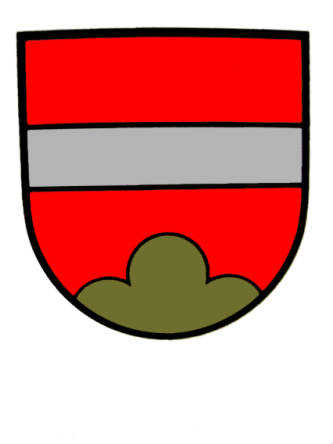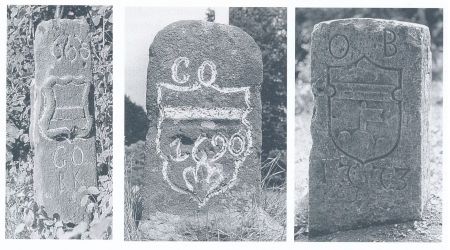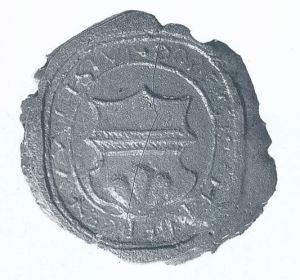Oberbergen: Difference between revisions
Knorrepoes (talk | contribs) No edit summary |
Knorrepoes (talk | contribs) m (Text replacement - "↵↵'''" to "'''") Tags: Mobile edit Mobile web edit |
||
| (28 intermediate revisions by the same user not shown) | |||
| Line 1: | Line 1: | ||
'''OBERBERGEN''' | '''OBERBERGEN''' | ||
| Line 12: | Line 5: | ||
Incorporated into : 1973 [[Oberrotweil]] (1977 [[Vogtsburg im Kaiserstuhl]]) | Incorporated into : 1973 [[Oberrotweil]] (1977 [[Vogtsburg im Kaiserstuhl]]) | ||
[[File:oberbergen.jpg|center]] | [[File:oberbergen.jpg|center|alt=Wappen von {{PAGENAME}}/Arms (crest) of {{PAGENAME}}]] | ||
{| class="wikitable" | |||
|+Official blazon | |||
|- | |||
|'''German''' | |||
| In Rot über goldenem Dreiberg ein silberner Balken. | |||
|- | |||
|'''English''' | |||
| blazon wanted | |||
|} | |||
===Origin/meaning=== | |||
The arms were officially granted by the State Archives of Baden in 1902, but only adopted by the municipality in 1920. | |||
The arms show the silver bar in red for Austria, as the village was part of the Austrian area in Baden until 1806. The golden hills (Berge) are a canting symbol. | |||
The oldest use of arms by the village is known since 1665. On a border stone from that year the Austrian arms appear as village arms. In a later stone from 1690 the hills already appear in the base. A third one, from the mid 1700s does not show any arms, but only the three hills. The last known borderstone dates from 1773 and shows the arms with the bar and hills, but also with an additional banner. This banner (Fahne) refers to the Lords of Fahnenberg, who ruled the village at the time. | |||
{|align="center" | |||
|align="center"|[[File:{{PAGENAME}}2.jpg|450 px|center|Wappen von {{PAGENAME}}/Coat of arms (crest) of {{PAGENAME}}]] <br/>The borderstones from 1665, 1690 and 1773<br>Image from John, 1994 | |||
|} | |||
The oldest seal of the village dates from the early 18th century and is known since 1749. It also shows the arms with the bar and hills. A second, 19th century, seal shows the same composition. | |||
{|align="center" | |||
|align="center"|[[File:{{PAGENAME}}z1.jpg|300 px|center|Wappen von {{PAGENAME}}/Coat of arms (crest) of {{PAGENAME}}]] <br/>The oldest seal of the village<br>Image from John, 1994 | |||
|} | |||
The arms have thus been in use since the late 17th century, but the colours were not known, as no colour images exist. The State Archives thus proposed in 1902 the Austrian colours and golden hills. | |||
{{de}} | |||
{{media}} | |||
[[Literature]] : | [[Civic Heraldry Literature - Germany|'''Literature''']]: John, 1994 | ||
[[Category:German Municipalities O]] | [[Category:German Municipalities O]] | ||
| Line 27: | Line 47: | ||
[[Category:Breisgau-Hochschwarzwald]] | [[Category:Breisgau-Hochschwarzwald]] | ||
[[Category:Freiburg]] | [[Category:Freiburg]] | ||
[[Category:Granted 1902]] | |||
Latest revision as of 14:44, 7 January 2024
OBERBERGEN
State : Baden-Württemberg
District (Kreis) : Breisgau-Hochschwarzwald (until 1973 Freiburg)
Incorporated into : 1973 Oberrotweil (1977 Vogtsburg im Kaiserstuhl)
| German | In Rot über goldenem Dreiberg ein silberner Balken. |
| English | blazon wanted |
Origin/meaning
The arms were officially granted by the State Archives of Baden in 1902, but only adopted by the municipality in 1920.
The arms show the silver bar in red for Austria, as the village was part of the Austrian area in Baden until 1806. The golden hills (Berge) are a canting symbol.
The oldest use of arms by the village is known since 1665. On a border stone from that year the Austrian arms appear as village arms. In a later stone from 1690 the hills already appear in the base. A third one, from the mid 1700s does not show any arms, but only the three hills. The last known borderstone dates from 1773 and shows the arms with the bar and hills, but also with an additional banner. This banner (Fahne) refers to the Lords of Fahnenberg, who ruled the village at the time.
| The borderstones from 1665, 1690 and 1773 Image from John, 1994 |
The oldest seal of the village dates from the early 18th century and is known since 1749. It also shows the arms with the bar and hills. A second, 19th century, seal shows the same composition.
| The oldest seal of the village Image from John, 1994 |
The arms have thus been in use since the late 17th century, but the colours were not known, as no colour images exist. The State Archives thus proposed in 1902 the Austrian colours and golden hills.
This page is part of the German heraldry portal Deutsche Wappensammlung |
Heraldry of the World |
|
German heraldry:
|
Selected collector's items from Germany:
|
Contact and Support
Partners:
Your logo here ?
Contact us
© since 1995, Heraldry of the World, Ralf Hartemink 
Index of the site
Literature: John, 1994














